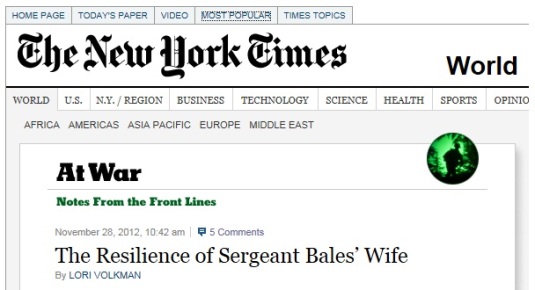 Admission against interest: I am a #KetchupGate2013 instigator.
Admission against interest: I am a #KetchupGate2013 instigator.
In my dearth of blogposts here at Witty Little Secret I’ve been writing as Communications Director for the Military Spouse JD Network where I’ve been able to write about some amazing new connections between the military and civilian communities. It has become my writing passion to find new ways to connect these two communities. It’s a daunting task trying to get the attention of a population who is unfamiliar with the issues military families find important, but telling stories seems to be a viable bridge across that gap. People write me to say they feel new appreciation for something they never quite understood.
Until somebody messes things up.
If you aren’t connected to the military family online community, you may not know what I’m talking about. An editor at the Washington Post wrote an article about Commissary cuts being indicative of the military entitlement attitude, with an accompanying graphic that depicted “booming” military benefits. It portrayed one-time budget fixes (like adjusting military pay to civilian equivalents) as an alarming trend that would eventually overtake the entire Pentagon budget. It compared military medical out of pocket expenses with civilian family medical costs without accounting for twelve years of war, nor the comparable benefits of union-backed law enforcement and firefighters who engage in inherently risky professions. The author suggests that the presence of filet mignon in a Commissary means our military members can and do regularly afford such things. His all-too-common theme that military families are selfishly living off the taxpayer teat while the rest of the civlian taxpayers suffer is exactly the acrid media tone military families often encounter. Unless they come home without limbs, military members who stand up and say “don’t cut our benefits” are perceived as entitled prima donnas.
The military community responded to the Washington Post, and in our little world it became a big damn deal:
Military Spouses Send Ketchup to Washington Post, by Reda Hicks at Military Spouse JD Network
KetchupGate: Military Families Out of Touch, by Adrianna Domingos-Lupher at NextGenMispouse
Open Letter to Military Benefits Haters, by Amy Bushatz at SpouseBUZZ.com
Let Them Eat Ketchup, by Rebekah Gleaves Sanderlin at Operation Marriage
Thanks of a Grateful Nation, by LibArmyWife at Left Face Blog
The Great Divide, by Babette Maxwell at Military Spouse Magazine
Put Down the Ketchup and Pick up a Pen, by Karen Golden at Making It In the Mil Life
Rajiv Chandrasekaran Doesn’t Like You, by blogger at This Ain’t Hell, But You Can See it From Here
Fact vs. Fiction, by Col. Mike Hayden at the Military Officer’s Association of America
Amy Bushatz Wins America, by Just Another Snarky Navy Wife
Each of the articles took a different angle at explaining why the WaPo editor’s sentiment got it wrong. Some used analogies. Some used facts. Some even used data to combat The Post’s graphic and tell the full story. But none of them got attention. They were preaching to their own choir.
Then military family columnist and author Sarah Smiley, someone with a captive national audience due to her popular columns and books, broke rank and wrote an article defending the Washington Post article. She said that we should have read the article more fully. She said that we missed the point. She said that when we criticize articles like this with a knee-jerk it only widens the military-civilian divide. She said that Chandrasekaran’s point was only that the military should make better use of its’ resources so that military families could have more and better benefits.
Actually, no he didn’t. He may want to convey that message now that military families have coined the phrase “KetchupGate” to describe the backlash. He may wish he had said as much, now that he’s been taunted on social media while families have posted pictures and sent crates of ketchup to his office at The Washington Post. But what he actually said was this: Legislators won’t touch Defense spending cuts for fear of highly organized non-military sentiment, and Commissaries are a good example of where we should be slashing the entitled military down to size. In fact the very title of his piece evidences that message.
In probably the most puzzling of moves, Sarah Smiley once understood this criticize-and-take-it-back game when she blasted a similar article in the Huffington Post just two months ago:
- I agree with Wood that there are many areas of wasted spending in the military. As with any government agency, it is full of redundancies, inefficiencies and frustrations. The general public will learn more about this when they, too, are in government-run health care. But to say that service members have an overabundance of allowances and bonuses is inaccurate and frankly offensive. While Wood is hurriedly deleting his words and “facts,” making edits as the pressure ensues, may I suggest that he go ahead and backspace over the whole thing, sending this Frankenstein back to the lab?
Ironically, she even talks about why her husband should be entitled to shop at a tax-free Commissary.
The bottom line is this: these aren’t the right line items to be on the chopping block. If the Pentagon decides to cut the Commissaries, fine. But every bit of that windfall should be sent to our troops. Not back to Congress.
Let me tell you about the author of the WaPo article for a frame of reference. This Washington Post journalist’s newly released book blames Afghanistan failures on the “C-Team” that was sent in. He refers to our military as the “loyal and willing instead of the best and the brightest.” And that exemplifies exactly what’s wrong with this military-civilian divide. The perception that our military are too dumb to get other jobs, and have enlisted to take advantage of tax-funded benefits. That in our pea little brains the fifteen brands of ketchup will somehow make it all worthwhile.
Smiley’s “let’s not make waves or we’ll irritate the civilians” sentiment also completely fails to address the graphic that accompanied the article (which in the paper version was featured on the front page, above the fold). By lack of context it suggested two things: (1) Military benefits are out of control and will continue to rise and eat into other areas of the budget unless put in check. But the figures fail to recognize that the rises were attributable to two large one-time fixes (including salary catch-ups to meet civilian force equivalents) and create typical alarmist “projections” that are completely out of whack; and (2) that military retirees aren’t paying their “fair share” of medical benefits as compared to civilian public retirees. That comparison fails to consider comparable professions like law enforcement, first responders, firefighters, and other risky endeavors. When compared, these medical benefits are right on.
I love Sarah Smiley’s writing, articles, and support of the military family. I’ve been reading her work since I started writing about military family issues. But we need voices, not taming. It’s really not about the ketchup. It is indeed about this article’s tone and the journalist’s divisive dig. It’s time for a new angle on bridging this gap. And it might require advocacy instead of bridging, sometimes.
The one thing about Smiley’s article that I agreed with is the idea that we need civilian support and we shouldn’t be so quick to bite the hand that feeds us. Because frankly we’re outnumbered. But we also shouldn’t remain silent when we are mischaracterized. We shouldn’t keep taking it. We didn’t write that mischaracterization and cause trouble – we only responded to it and tried to set the record straight.
We can’t heal the gap between us until we can find a common ground. And that means papers like the WaPost shouldn’t take digs and expect us to remain obediently silent. We may be outmanned, but we’re not giving up. We’re the loyal and the willing. And we will defend ourselves.
![IMG_20130202_194305[1]](https://wittylittlesecret.files.wordpress.com/2013/02/img_20130202_1943051.jpg?w=300&h=300) For the past five years Military Spouse Magazine has presented an annual award, the “Armed Forces Insurance Military Spouse of the Year®.” Though it’s not officially sanctioned by the U.S. Military, it’s no beauty contest either. 2012’s award to Jeremy Hilton is proof of that. I can personally verify that he would look
For the past five years Military Spouse Magazine has presented an annual award, the “Armed Forces Insurance Military Spouse of the Year®.” Though it’s not officially sanctioned by the U.S. Military, it’s no beauty contest either. 2012’s award to Jeremy Hilton is proof of that. I can personally verify that he would look 



 Staff Sgt. Jimmy McEwing greeted us at the door. We shared that familiar military moment as we discussed his hometown and one of my old Navy brat haunts, Jacksonville, Florida. His wife Mary was from Texas, and seemed to flawlessly manage the three year-old, two year-old and precious 5 month-old children who wanted desperately to see what kinds of shiny objects we were hauling in the door. Like many military families, the age difference between child one and two is representative of time spent apart. We set up a corner Christmas tree in three quick snaps and let the boys decorate the limbs with ornaments, unintentionally sprinkling glitter all over Mary’s floors while the Operation Homefront representative, Kari McClellan, seized the opportunity to snap up the baby. I stood back to take a picture or two and laughed, thinking how that Christmastime is full of mess-making opportunities happily legitimized as a chance to get closer to another human. My kitchen floor and the flour still on my kids’ faces was further evidence of that sentiment.
Staff Sgt. Jimmy McEwing greeted us at the door. We shared that familiar military moment as we discussed his hometown and one of my old Navy brat haunts, Jacksonville, Florida. His wife Mary was from Texas, and seemed to flawlessly manage the three year-old, two year-old and precious 5 month-old children who wanted desperately to see what kinds of shiny objects we were hauling in the door. Like many military families, the age difference between child one and two is representative of time spent apart. We set up a corner Christmas tree in three quick snaps and let the boys decorate the limbs with ornaments, unintentionally sprinkling glitter all over Mary’s floors while the Operation Homefront representative, Kari McClellan, seized the opportunity to snap up the baby. I stood back to take a picture or two and laughed, thinking how that Christmastime is full of mess-making opportunities happily legitimized as a chance to get closer to another human. My kitchen floor and the flour still on my kids’ faces was further evidence of that sentiment.
 I stared up at what looked like a fraternity house perched on top of a hill. The Home Depot Foundation brought me to Columbus, Ohio for another Celebration of Service project, and this was different than any other so far. I was there to see an entire dorm get renovated for students who also happened to be U.S. Military Veterans. Unlike my trip to
I stared up at what looked like a fraternity house perched on top of a hill. The Home Depot Foundation brought me to Columbus, Ohio for another Celebration of Service project, and this was different than any other so far. I was there to see an entire dorm get renovated for students who also happened to be U.S. Military Veterans. Unlike my trip to 






